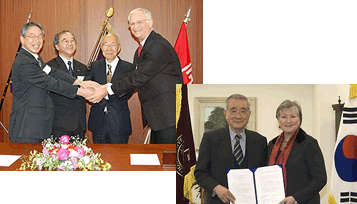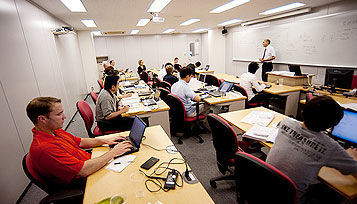In 2009 TUJ issued a 5-year strategic plan. Our 30th anniversary comes halfway through this plan, which is summarized below. Though it reflects some modifications following the events of March 11, 2011 and the continued strengthening of the yen, its main objective remains unaffected: To insure that TUJ will be as relevant and vibrant 30 years from now as it is today by meeting the challenges of today and the future.
1. Fostering partnerships

The globalization of higher education means that the educational needs of many countries are converging as their cultural and economic systems become more connected. TUJ can help in that transformation by providing the skills and abilities needed by a global workforce through educational and research collaboration with various institutions in Japan, the United States and around the world. To that end, TUJ has undertaken several initiatives to partner with both Japanese and non-Japanese universities in order to mutually broaden the educational and research opportunities for students and faculty.
In particular, our partnerships with Japanese universities, such as Musashi University, are intended to support the internationalization of higher education in Japan. In the coming years, TUJ will continue to capitalize on existing partnerships, including the development of dual-degree programs, as well as cultivate new alliances in order to accomplish the educational missions of both parties.
On the international front, a new three-way partnership between TUJ, the main campus and Sejong University in Seoul is a good example of how Temple is leading the way in the globalization of higher education by creating multi-country, multi-institution agreements. Partnerships with American community colleges will also continue to be an important way for TUJ to support the growth of academic programs and internationalization in a vital and growing sector of American higher education.
2. Strengthening core academic programs

As the world changes and as TUJ changes, our academic policies are under constant review in order to insure that they remain relevant and are supportive of both our students' and society's needs. It is for that reason that we have undertaken some major academic initiatives in the past 3 years which include redesigning the undergraduate business program to improve our students' multi-cultural cognitive and communications skills, and the development of a new major in Japanese as a means of both supporting our non-Japanese students who wish to be employed in Japan, and serving Japanese firms that need to hire more non-Japanese employees.
Looking to the future, TUJ is expanding its educational offerings in order to attract a wider variety of students. TUJ is now developing new 2+2 programs with the main campus in Computer Information Science and Health Information Management. This is the first of several such programs in which students can begin their studies in Tokyo and complete them in Philadelphia. Similarly, a 3+2 dual master's/bachelor's degree program in Communication Studies is under development that will allow our students to finish both degrees in five years by a combination of study at TUJ and the main campus.

TUJ's graduate programs are also developing new initiatives for the future. The masters' and doctors' degrees in TESOL are among TUJ's oldest and most successful programs, with more than 1,500 alumni in English education field nationwide. The program is building upon past successes in order to support the increasing need for quality English education at all levels in Japan through professional development for administrators and faculty. TUJ is the only American graduate TESOL program in Japan that offers a doctoral degree, and it plans to offer a new Ph.D. program in collaboration with the College of Education.
The Beasley School of Law LLM Program at TUJ started in 1993 and has a strong 18-year record in educating legal professionals and students. The Fox School of Business and Management MBA program, began in 1996, also has been providing professional training to corporate executives and organization leaders. Both programs will continue to innovate to accommodate the changing needs of professionals and corporate employees in Japan, and the increased use of information technologies to support remote education.
TUJ also plans to develop a greater range of certificate programs and adult education courses that are designed for the Japanese market, such as a quality assurance/regulatory affairs program for pharmaceutical industry professionals.
3. Increasing enrollment while maintaining diversity—We are our students
In the decade preceding the March 2011 disaster, the number of TUJ students continued to grow steadily and to become more diverse. This trend was accelerated after we received recognition as a Foreign University, Japan Campus (FUJC) by Ministry of Education in 2005 which gave us the ability to support foreign student visas, thus opening our recruiting to the world.
TUJ currently maintains a balanced student body of 40 percent Japanese, 40 percent American and 20 percent from over 50 other countries. Although the current percentage of Japanese students is lower than the ideal 50:50 balance, TUJ is committed to providing our students the diversity that is so important to a liberal arts education. Beyond national, racial and cultural diversity, we will also continue to maintain the diversity in age and experience among our students that makes TUJ classes lively and interesting.
TUJ's goal is to increase enrollment while maintaining diversity. The authentic nature of TUJ's liberal arts education and the relation between it and the high placement rate of all graduates, especially Japanese, provides a firm base upon which to develop domestic enrollment. On the other hand, there is no doubt that the strength of the Japanese yen has made studying in Japan more expensive for foreigners and therefore TUJ will focus on students who have a high interest in studying in American universities and in Japan, who come from countries with stronger currencies vis-a-vis the yen.
Students that receive financial benefits from the US government under the Servicemen's Readjustment Act (GI Bill) now make up about 10% of the undergraduate student body. In the postwar period many US servicemen have remained in Japan after leaving the military and TUJ will continue to actively recruit these GI Bill students who are symbolic of the most positive elements of the US-Japan relationship.
TUJ is also the beneficiary of financial support for international students from their respective governments. One recent example is that the Saudi Arabian Ministry of Higher Education has officially designated TUJ as an institution at which all Saudi students are eligible to apply for full scholarships provided by the Saudi Government.
4. Directly meeting the demand from businesses - Corporate Education Programs
The strong yen and an uncertain domestic economic and political situation are forcing more Japanese firms to move their operations abroad, and are giving rise to imports. This has increased the need for Japanese corporations to insure that their employees are not only capable of communicating in English but are also knowledgeable about the world outside Japan and comfortable operating in different environments.
TUJ is determined to seize this opportunity and expand its custom-made Corporate Education programs by providing the services needed by multi-national corporations in Japan under the current economic conditions.
Reaching out beyond traditional corporate markets, TUJ is now becoming a recognized facilitator for training programs for government agencies of South East Asian countries that are funded by Japanese Overseas Development Assistance. We expect these programs to increase in the coming years.
5. Serving the community
Like all American universities, TUJ has a strong commitment to serving our community through encouraging volunteerism, providing education to the community through organizations and events such as the Minato Citizen's University and our Continuing Education programs, offering professional development to local public primary and secondary school faculty, and extending support in times of need and crisis.
TUJ will continue to improve our presence in the community through our long-standing partnership with Minato-ku and other channels.
In 2011, following the 3/11 event, many TUJ students, faculty and staff have devoted their time to volunteering in Tohoku and Temple's main campus created a successful Japan Relief Fund. Teaching by example is important and by being a good citizen in its community, TUJ provides an important lesson for its students.
6. Strengthening our foothold — legal status and campus improvement
Although TUJ is recognized by the Japanese government as a FUJC, there remain some barriers that prevent TUJ from contributing further to Japanese society. Due to our legal status as a for-profit organization, TUJ is subject to Japanese corporate income and consumption taxes. In addition, it is not eligible to apply for Japanese government competitive grants and programs, such as the Global 30 Initiative.
TUJ has worked, and will continue to work, to gain full-fledged educational status, possibly through the creation of a new category of universities in Japan specifically designed for FUJC. Such status would give TUJ the financial stability necessary to fulfill our educational mission and aid our ability to support Japanese higher education.
TUJ is currently housed in three separate buildings designed for office-use. This restricts its activities and imposes a ceiling on enrollments. TUJ continues to try to accommodate the needs of our students and faculty by reconfiguring our current space. However, in the longer term, TUJ continues to work toward acquiring a new location that will enable it to meet all its educational needs while enhancing students' quality of life.
